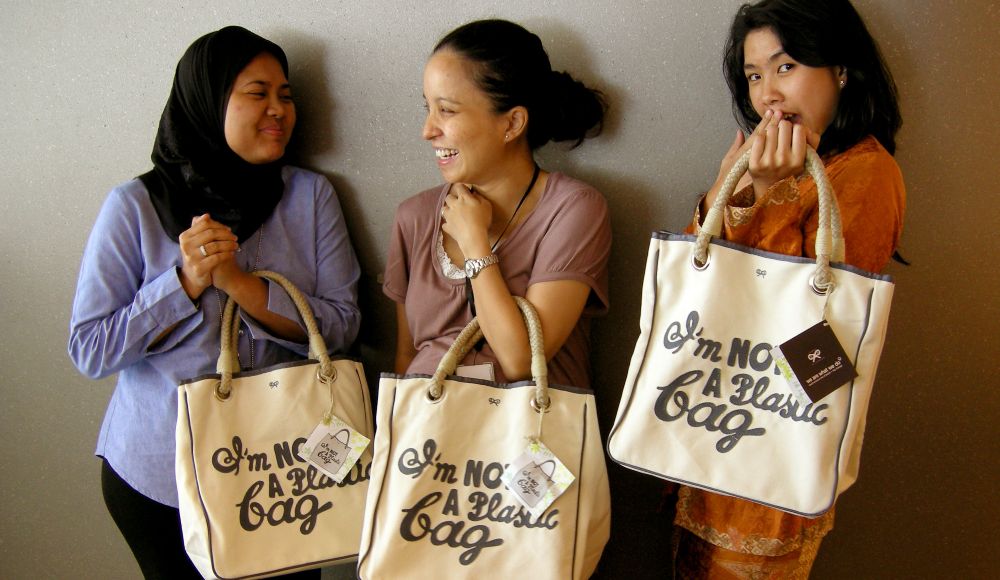The low point of every trip to the supermarket comes when I’m confronted with that deeply religious question: Paper or plastic? I try to remember to bring my reusable cloth bags, but memory often fails me, so I find myself stuttering, groping for the environmentally correct answer.
Even though, as I learned some time ago, there isn’t one.
I recycle in large part because I was raised that way. My parents were depression kids who hated to waste stuff, so they reused everything they could – from cottage cheese containers to newspapers to, yes, grocery bags. Dad did the shopping, clipped coupons and shopped three different stores, setting his route to use the least gas.
I inherited much of that value system. I reuse cottage cheese containers, but also ziplock bags, which I rinse carefully and hang upside down over the sink, driving my wife nuts.
But at some point, recycling morphed from a matter of frugality into environmental ethics, and then of theology. Our answer to the paper-or-plastic question became a sacrament, a ritual of mysterious and sacred significance.
Some years ago, I spent a couple of days calling the experts, asking which is the Path to Virtue? Paper or plastic? Paper, said the paper people. A Weyerhaeuser guy argued that paper is highly biodegradable and easy to recycle.
Plastic, said the guy at the American Plastics Council. They’re easier to carry, their production uses less energy and they can be re-used. I talked to the garbage people that run the landfills, but they were firmly agnostic. They could care less what bags are made of.
I talked to local and national recycling advocates. Most recommended reusable cloth. If you forget your cloth bags? The experts seemed to be evenly divided between paper and plastic.
More recently, smart people from Stanford to the UK and National Geographic have published intricate studies, analyzing the economic and environmental costs. Plastic bags cost less to produce, both in dollars but in energy — fewer carbon emissions, less water. But, once disposed, they don’t biodegrade, so they litter the environment and pollute the oceans and the food chain.
Paper bags are easier to recycle, and they can be used for composting. But, then again, their manufacture uses four times more energy than plastic.
And reusable bags? The UK study found that cotton-based bags require more water and energy to produce, hence a far greater carbon footprint. To offset those costs, one needs to reuse each bag 131 times. Ironically, perhaps, non-cotton bags, made from polypropylene, have a much smaller footprint.
So where does that leave us? In a world strewn with carbon-spewing lawn mowers, Dodge Ram pickups, Boeing airliners and coal-fired power plants, grocery bags are not a significant factor. But they are something we have control over. It may be ritual, but we get to step up and decide.
So it was that, just the other day, I did my duty at Safeway and brought my own cloth bags – polypropylene, not cotton, compliments of Subaru and National Public Radio.
This time, however, as I pondered the question, I decided to consult with the ultimate expert – the pleasant young woman who was bagging my groceries. What, I asked, works best for you?
“Cloth,” she said. “No contest.”
Why? “You can get more stuff in each bag. And they’re stronger. They don’t tear. The handles don’t break. It’s not even close. And you can use them over and over again, right?”
Praise the lord. I go forth in peace, content in the knowledge that my frugality also works for the baggers in my life.
Discover more from Post Alley
Subscribe to get the latest posts sent to your email.

Thanks, Ross. Always wondered about the choice when I forget cloth bags (not often but it does happen). Since I shop weekly, I guess it takes two years of reuse for cloth bags to earn their keep. Believe I might have aced it, however. I still have one cloth bag that looks like a P-I front page.
If you use cloth or heavy duty poly bags, remember to clean them out from time to time. Cashiers I’ve talked to have some pretty grim stories about what they’ve found in the bottom of those bags.
Good story. I probably have 30 cloth shopping bags hanging on a coat tree by the back door but still manage to forget to take them back to the car half the time.